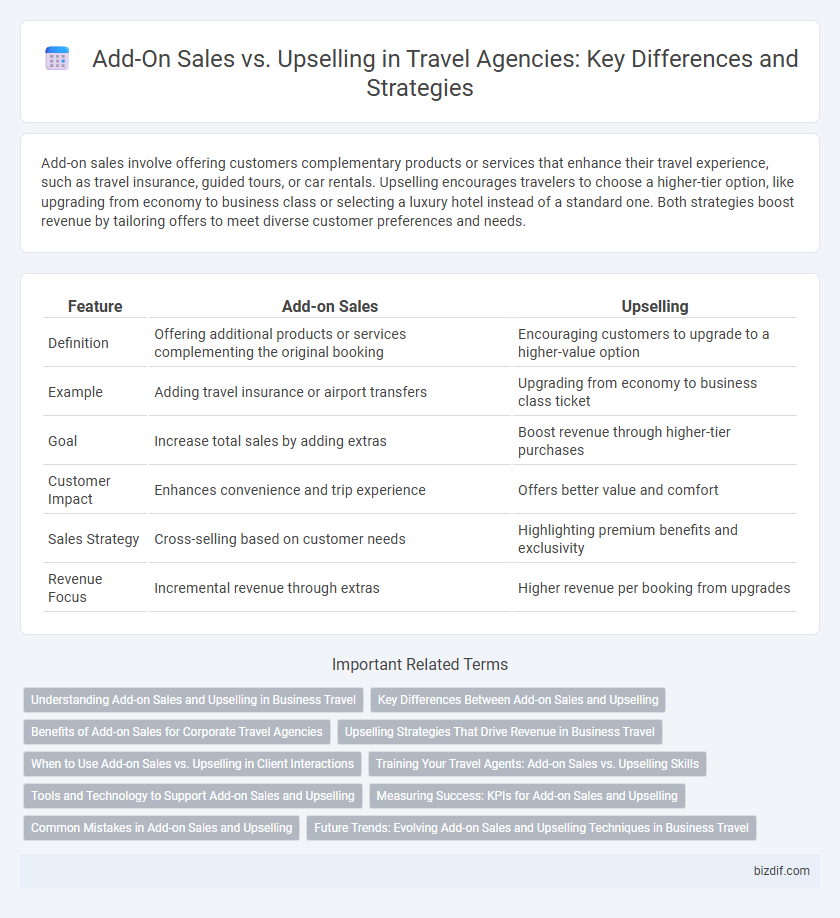Add-on sales involve offering customers complementary products or services that enhance their travel experience, such as travel insurance, guided tours, or car rentals. Upselling encourages travelers to choose a higher-tier option, like upgrading from economy to business class or selecting a luxury hotel instead of a standard one. Both strategies boost revenue by tailoring offers to meet diverse customer preferences and needs.
Table of Comparison
| Feature | Add-on Sales | Upselling |
|---|---|---|
| Definition | Offering additional products or services complementing the original booking | Encouraging customers to upgrade to a higher-value option |
| Example | Adding travel insurance or airport transfers | Upgrading from economy to business class ticket |
| Goal | Increase total sales by adding extras | Boost revenue through higher-tier purchases |
| Customer Impact | Enhances convenience and trip experience | Offers better value and comfort |
| Sales Strategy | Cross-selling based on customer needs | Highlighting premium benefits and exclusivity |
| Revenue Focus | Incremental revenue through extras | Higher revenue per booking from upgrades |
Understanding Add-on Sales and Upselling in Business Travel
Add-on sales in business travel involve offering complementary products or services, such as airport transfers or travel insurance, enhancing the traveler's overall experience without replacing the original purchase. Upselling focuses on encouraging clients to upgrade their current booking, like moving from economy to business class or selecting a premium hotel room. Understanding these strategies enables travel agencies to increase revenue while meeting diverse client needs through tailored service enhancements.
Key Differences Between Add-on Sales and Upselling
Add-on sales involve offering complementary products or services that enhance the main purchase, such as travel insurance or airport transfers added to a flight booking. Upselling focuses on encouraging customers to buy a higher-end product or upgrade, like upgrading from economy to business class. Key differences include the objective--add-on sales increase the overall value by adding new items, while upselling aims to elevate the quality or level of the original purchase.
Benefits of Add-on Sales for Corporate Travel Agencies
Add-on sales in corporate travel agencies increase revenue by offering clients additional services such as airport transfers, travel insurance, and lounge access, enhancing the overall travel experience. These tailored upgrades improve customer satisfaction and loyalty by addressing specific business traveler needs without significantly raising the base trip cost. By focusing on add-ons, agencies can differentiate their services, create more personalized travel plans, and capture higher profit margins with minimal sales resistance.
Upselling Strategies That Drive Revenue in Business Travel
Upselling strategies that drive revenue in business travel focus on offering premium cabin upgrades, flexible ticket options, and exclusive lounge access to enhance customer experience and increase transaction value. Personalized recommendations based on client travel history and corporate policies align with customer needs while boosting airline partnerships and affiliate commissions. Leveraging data analytics to identify high-value travelers enables targeted promotions that maximize revenue without compromising customer satisfaction.
When to Use Add-on Sales vs. Upselling in Client Interactions
Add-on sales are ideal when clients show interest in enhancing their travel experience with supplementary services like guided tours, meal packages, or travel insurance. Upselling works best when clients are open to upgrading their existing booking, such as moving from standard to premium flights or selecting luxury accommodations. Recognizing client preferences and budget constraints helps travel agents tailor their approach to maximize satisfaction and revenue during interactions.
Training Your Travel Agents: Add-on Sales vs. Upselling Skills
Training travel agents to master add-on sales focuses on promoting complementary services such as travel insurance, guided tours, or airport transfers that enhance the customer's original booking. Upselling skills concentrate on persuading clients to upgrade existing purchases, like moving from economy to business class or selecting premium accommodations. Developing both strategies improves revenue streams while tailoring personalized travel experiences for clients.
Tools and Technology to Support Add-on Sales and Upselling
Travel agencies utilize advanced CRM software and AI-driven recommendation engines to enhance add-on sales and upselling, enabling personalized offers based on customer preferences and booking history. Integration of mobile apps and digital payment solutions streamlines the purchase process for supplementary services like upgrades, tours, and insurance, increasing customer conversion rates. Data analytics platforms track sales patterns and customer behavior, empowering travel agents to tailor promotions and optimize revenue generation effectively.
Measuring Success: KPIs for Add-on Sales and Upselling
Tracking conversion rates, average transaction value, and customer retention are essential KPIs for measuring success in add-on sales and upselling within a travel agency. Monitoring the attachment rate of add-ons such as travel insurance, guided tours, or upgrades helps evaluate campaign effectiveness. Revenue growth per customer and customer satisfaction scores provide additional insight into the long-term impact of upselling strategies.
Common Mistakes in Add-on Sales and Upselling
Common mistakes in add-on sales and upselling within the travel agency industry include pushing irrelevant upgrades that do not match customer preferences, which can lead to dissatisfaction and lost trust. Overloading clients with excessive options during booking overwhelms decision-making and reduces conversion rates. Failure to personalize offers based on traveler data and booking history results in missed opportunities for higher revenue and enhanced customer experience.
Future Trends: Evolving Add-on Sales and Upselling Techniques in Business Travel
Future trends in business travel emphasize personalized add-on sales leveraging AI-driven analytics to anticipate client needs and preferences, enhancing customer experience and increasing revenue. Upselling techniques are evolving with virtual reality previews and dynamic pricing models that tailor premium offers in real time. Integration of mobile platforms and seamless payment solutions streamlines these strategies, making them more efficient and customer-centric.
Add-on Sales vs Upselling Infographic

 bizdif.com
bizdif.com